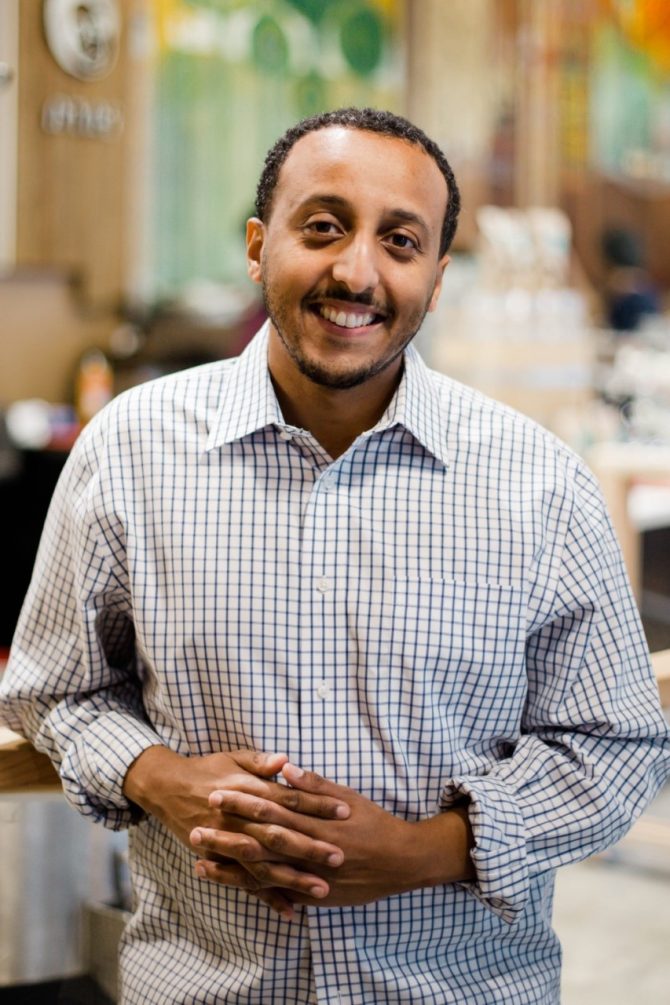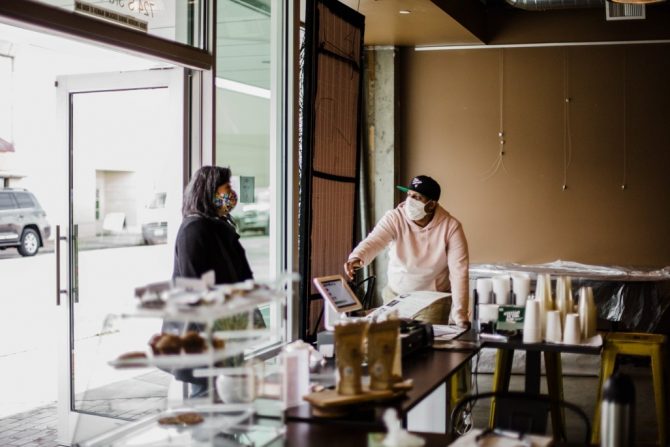In this series of interviews, we explore stories from immigrant/BIPOC*/women business owners who have adapted during the pandemic. The purpose is to learn and connect through shared experience. In this interview, Jo Anderson Cavinta (Diversity Services Coordinator at KCLS) spoke with Efrem, CEO and Founder of a coffee shop and exclusively African-sourcing roaster located in Renton.
*BIPOC means "Black, Indigenous, and People of Color."
Meet Efrem, CEO and Founder of a Coffee Business
Efrem is of Eritrean descent. His parents came to the U.S. in 1988 when his father started working for Boeing. He was raised in West Seattle, studied at Washington State University and began a career in auditing and corporate finance for Nordstrom and Amazon. In 2011 he took a trip to Asmara, Eritrea that changed his life. “The entire cafe experience was vibrant and beautiful. There was a smell not familiar to Seattle. That ambiance and experience is what inspired my journey into coffee.”
“We’re serious about our coffee.”
As banks rejected loans for his business plan, Efrem differentiated his approach from Seattle’s Starbucks coffee culture by focusing on an East African tradition and audience. He reached out to friends and family in Ethiopia, the birthplace of coffee, about sourcing.
Support came from his community. Demand for good, green coffee beans like the ones back home was an opportunity to source from African growers and distribute to south King County small businesses. In January 2019, he opened a coffee house in Renton that included a roastery as well as space for art, poetry, family Story Times, “pop-up” food vendors and more.
“There’s a cultural component, a sense of reverence. Here we’re used to drive-throughs to get our coffee. In my culture, a coffee ceremony can last three hours. This is a time of gathering and hearing how everyone is doing.”
Then COVID-19 hit.
“I remember the first day. I was really concerned about my team. This was my first time as an employer and I was concerned about their health and surviving.” The Sunday before the new guidelines took effect, Efrem and his team determined they could serve customers from the door. By Wednesday, they knew that plan wasn’t going to work. “We called the Employment Security Department that Thursday. I worked seven days a week to keep it going, while two people at a time were working the espresso bar and the front door.”
A turning point.
“We also noticed people going to our website more.” Efrem and his cousin worked on developing their eCommerce, adding a monthly coffee subscription and product discounts. “What we lost from coffee consumption, maybe we can make up with roasting and distribution.” With more people trying their coffee from home, they were able to get reviewed by a national board. One of their coffees was a national finalist, a feat for new roasters!
He also applied for grants and the Paycheck Protection Program (PPP), a hurried and taxing process that didn’t provide much support. “It was like a lotto, essentially.” Efrem noted that “being able to pivot is a luxury that requires time and means.”
“I was raised here and am familiar with things like checking email.” Efrem was concerned for surrounding mom-and-pop businesses, “they’re all working around the clock and are not on Facebook hearing about these things, especially not in their language.” More challenges came when the city began road construction in areas lined with small businesses.
“We’re out here fending for ourselves, and the best hope for us is that collaborative spirit.”
Efrem built a coffee business based on the values of mutual support and collaboration. “As we get to keep growing, there’s more possibility to invest in people.” He works with local community-based organizations and business owners to fundraise for Feast Seattle and the National Urban League, for example.
“It’s a very difficult time and there are many issues our communities are facing. With the murder of George Floyd, for example, we do things that speak to our values” like supporting and handing out hot coffee during the Black Lives Matter Silent March last June. He also noticed a bump in support for Black-owned businesses during this time.
The road ahead.
It’s uncertain how winter will impact his business. For now, Efrem will continue focusing on eCommerce and expanding distribution to grocery stores, cafés and other places. “We’ll see where we are in the new year and hopefully can start seeing guests inside again.”
Efrem’s Business Tip: Denkyem Coop, providing access to affordable loans for Black-owned businesses in the Puget Sound Region.
Support your local small business community! For more financial and small business resources, visit Invest in Yourself.
The Welcoming Center for immigrants, refugees and new arrivals connects you to the people and resources in the area you live.



